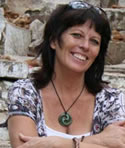The first time I walked into a writer’s workshop, I had a story to tell and thought it was ready to rock and roll.
After all, hadn’t I just spent six months crouched over my laptop in the garage of my cousin’s house, wrapped in a blanket and writing my story?
Hadn’t the publisher agreed also that there was a story within the confusion of words I had strung together, and sent me along to the workshop so that I could begin to take the writing of it, and my writing, seriously?
I walked into that room and heard one of the tutors speaking to someone about what she was currently working on. “I am on the fifth draft,” she said. “And I think I have almost nailed it!”
Five times? FIVE? I almost turned around and walked out. One draft had been tough enough, quite apart from the living of the tale I wanted to tell.
Six years of living in the jungle with a Naga Baba was a story, I knew it but to write the thing five times again and again? No way! That just sounded like far too much work to me!
In those days I thought that writers – like journalists – threw a whole lot of words together, the editor went over it and then it hit the press. Easy peasy. NOT.
They assigned me an editor and I went to work on it for round three. He was in France, I was in India and we communicated via the Internet. I gave the whole thing a year which was the time I could reasonably spend on it, given that as a writer I also like to eat, and to do that I need to toss words on paper and send it into some editor or another and wait for the check.
The book still is sitting in the hard drive of my computer, the publishers ended up not thinking it would sell in the draft I offered them, and I went back to working for cash and chapatti.
Needless to say I was rather disappointed, but there was a lot of learning in that process that I apply with a lot more success to my work today.
Take your writing seriously.
Another thing I remember from that workshop was the same tutor saying that you needed to “write as if your life depended on it“.
By this she meant not to sit around waiting for inspiration, to scribble sweet one liners in your journal and think that one day you will sit down and get all those lines into something that is art.
Often it’s those lines of what you think of as so poetic that it made you heart surge that end up on the editing room floor.
Get over yourself.
If I had a dollar for everyone who said “How exciting to be a writer” then I wouldn’t have to write ever again. Only non-writers think that writing is exciting, only non-writers think that writers just bleed brilliance all over the page.
Writing is only ten percent inspiration and ninety percent hard work. If you wait for inspiration in order to write then keep a journal. If you want to write seriously then you need write as if your life depends on it.
Develop a Critical Eye for your work.
Yes, I know. You love that little story sitting in your drawer, your hard drive. And one day a publisher is just going to knock on your door and ask if you have a story for them to publish. NOT.
Get the story out now and read it aloud. How does it sound? Read it to your friends, your family and then read it to people who don’t love you so much and get their feedback. Ask yourself who your readership is, who are you writing this story for?
Accept Feedback even if it hurts.
Once you have won the Booker Prize then you can probably get a bit precious about your work, you can afford to throw artistic tantrums if someone criticizes your work. Otherwise you just have to take it on the chin and accept that the criticism is constructive and helpful. After all if the first person – outside your friends and family – has problems reading it then other people will too. And as one of my friends said to me when the work was rejected, “You want people to see your best work, don’t you? Imagine if you got bad reviews!”
Coming from a newspaper background where yesterday’s news is yesterday’s news, her words made me think a lot more seriously about having my words out there.
Become the Surgeon General of your work.
Think of your raw masterpiece as exactly that. All great painters have spent time looking at what lies beneath the human body before they paint it. They look at the skeleton, the muscles and the flesh of the human body before they put brush to canvas. It’s just a matter of understanding your subject matter better than anyone else. After all that’s why you are writing it, isn’t it?
Develop discipline and good habits.
Get up in the morning and write. Write whatever comes into your mind without editing or thinking. Then leave it and go for a walk or breakfast or whatever else you do first thing in the morning.
Then like anyone else sit down and start again. Give yourself a topic to write about. If you are stuck for ideas, look at websites like Hub pages or Suite 101 for hot topics. A lot of these sites have a word limit, so the challenge is to cover the topic completely within a short time frame.
A book that came into my hands and which I found invaluable (as did a singer friend of mine) is The Artist’s Way (Subtitled: A Spiritual Path to Higher Creativity) by Julia Cameron.
The book has a lot of sensible strategies to awaken the artist within you. I followed the strategies as I read, and now these strategies are part of my discipline of writing.
Set yourself a word challenge every day.
A friend of mine has this theory that everyone needs to say two thousand words a day, when he thinks he has reached his daily speaking limit he simply leaves the building.
Whether I am working on the Booker Prize-winning novel I have safely tucked away in my hard drive, or working on an assignment, or just throwing words into the cyber-ocean like messages in a bottle, I set myself a minimum of two thousand words a day. For me it’s words on a page; edited words on a page that is.
So go on. Try it for a fortnight, for a month, for a season and see what happens to your writing.
Slowly but surely you have begun to craft your work and conversely to be crafted by it into a writer. Now isn’t that exciting?
~Dianne
What strategies do you use to keep the words flowing? Share your advice!






Please don’t think me crass but finding sites like this (Travel Writers Exchange) fuels my enthusiasm for writing and keeps the words flowing.
.-= Smart Traveller´s last blog post: Airport Guides – Dubai International Airport =-.
Not crass at all – we really appreciate hearing that writers find TWE helpful and inspirational – thank you! :)
Great article and some excellent points. I have a 1000 word a day challenge that I just set for myself last week. So far, it is going okay but I am pushing myself to stick with it. I think the idea of writing as if your life depends on it as a good one and I am going to adopt it.
.-= Akila´s last blog post: unexceptional wonder =-.
Excellent point about reading out loud. I am lucky, I have Dave as a sound so many mistakes when I read it out loud as opposed to reading silently. I love the comparison to being an artist. It is true, you have to really know what you are writing about. It makes the article so much easier. Thanks for the great inspiration. I am going to go back to work on my Booker Prize novel now:-)
Great article! I recognised quite a few things. I have found myself that if you want to finish a book, it is very important to focus on that and nothing else. Not always easy, but it has to be done otherwise it will end up unfinished in a drawer.
I’m not working on a book at the moment, but before I used to write 1000 words in the morning and 1000 words in the afternoon. The next day before I started writing I would read what I had written the day before, edit it and continue. If a part or chapter was finished I would leave it alone for at least a week and then read it again. Mistakes would then jump out at me more clearly.
You’re so right when you say that writing a book is 10 percent inspiration and 90 percent hard work. Still, it’s a lot of fun and totally addictive.
.-= Maria Staal´s last blog post: The Peoples of Early Medieval Europe. Sounds boring, doesn’t it? =-.
Great points, great article!
.-= Abbie´s last blog post: C’mon Baby Light My Fire =-.
Wow thanks for your comments, team. It’s nice to know that even tho a writers life is a solitary one, that there are others out there with the same dreams and schemes and schisms!
.-= Dianne´s last blog post: ERUPTION DISRUPTION AND OTHER MUSINGS =-.
I personally think word challenges can stress people out so I write what works for me. With all of my blogging, writing projects and client work, I’m sure I pound out more than 2,000 words/day anyway, but when it comes to strict word counts, I just don’t do it unless it’s for NaNoWriMo.
One of the things I use for inspiration is a weekly meeting I have with some friends of mine every Monday morning. We talk about our writing goals and what we hope to accomplish for the week. After those meetings, I’m always fired up to write!
.-= JoAnna´s last blog post: How the Other Half Lives =-.
I love the idea of a weekly meeting with like-minded friends – such a great way to find inspiration and stay motivated, something we all need from time to time :)
Exhausting, ain’t it? Feels like a never-ending learning process…I guess it is.
.-= Candice´s last blog post: The Junos, Newfoundland Hospitality, and Celebrating Come-From-Aways =-.
I like to think that even authors with multiple awards for writing still work at learning and improving their craft…primarily because I think that without goals, what is the point of anything?
Great advice! I’ve found that I’ve had to develop my discipline a bit. I get easily distracted! And I also agree with Dave & Deb that reading aloud helps alot. Thanks for the great article :)